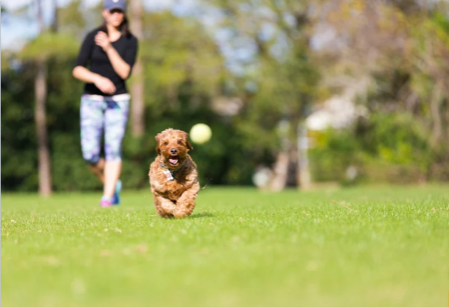The Science of Play: How Playtime Affects Your Dog’s Behaviour

Dogs aren’t just pets, they are a huge part of our lives and become our loyal companions. Sometimes we forget that they need to have time and space to live their best lives, and playtime should be a huge part of their everyday lives. Play is a lot more important for dogs than most people realise, and there is scientific evidence that shows that play affects a dog’s overall well-being and behaviour. In this blog, we will be exploring how regular playtime can help strengthen the bond you have with your dog, and how it affects their behaviour.
Dog Playtime Is More Than Just Fun
Play is a behaviour that is observed in many different species, not just dogs. From the second they are born as puppies, dogs engage in play and use it to learn about the world around them. If you watch puppies, they learn to develop social skills and quickly learn boundaries while playing with the rest of the litter.
In a wild environment, dog playtime is used to help them practice adult behaviours. Similarly, dogs use play to test their physical limits and understand social hierarchy in a domestic setting too. Play isn’t just about preparing for adulthood, it can significantly improve a dog’s mental health.
Psychological Benefits of Play
The main way in which play helps improve a dog’s well-being is by the release of endorphins such as dopamine and serotonin. These help to regulate mood, reducing feelings of stress and anxiety. Research shows that dogs who engage in play regularly have fewer behavioural problems such as aggression or excessive barking.
Dogs are also susceptible to stress and anxiety, particularly when they are exposed to changes in their environment or are separated from their owners. Interactive play is a great way to relieve stress in dogs as it means they can release any pent-up energy. This reduces the chance of them engaging in destructive behaviours.
Physical Benefits of Play
As dog playtime is a form of physical exercise, it can help keep dogs active and maintain a healthy weight as well as improve their cardiovascular health. Certain dog breeds, such as Border Collies, require lots of exercise to stay fit and healthy. If you haven’t always got time to take them for a long walk, dog playtime is a great alternative (but should not be substituted for their normal walk).
Socialisation
Dog playtime can really help with developing social skills, and going back to puppies, they learn how to interact with other dogs and humans while playing. Through play-fighting, chasing and wrestling, puppies learn how to read the body language of others and understand when they have taken playtime too far.
A well-socialised dog is more confident around others and is less likely to show signs of aggression. Even when dogs are in the later stages of their lives, they should still be encouraged to play with other dogs to help reinforce their social skills. Care should be taken to monitor these play sessions though to ensure they provide a positive experience.
Enhancing Motor Skills & Coordination
Dog playtime can really enhance a dog’s motor skills and coordination. Games like fetch and agility training require fast actions and spatial awareness. These types of activities help dogs develop muscle control and coordination, but do be careful starting this with younger dogs – their bones need to be developed and strong enough before they endure too much playtime.
For aging dogs, physical activity through gentle play can help keep their joints mobile and strengthen their muscles. This can help slow the progression of age-related diseases such as arthritis.
Strengthening Your Bond
One of the most rewarding aspects of dog playtime is how it strengthens the bond you have with your dog. Dog playtime is a great way for humans and dogs to interact in a fun way, helping to reinforce your relationship. Tug-of-war and fetch can help improve communication between you and your dog too.
Positive reinforcement helps to confirm to your dog which behaviours are desirable to you. For example, when they come back to you after playing a game of fetch, they should be praised and then will understand not to run away from you in the future.
Incorporating Dog Playtime Into Your Routine
Adding regular playtime to your dog’s routine doesn’t have to be too time-consuming. Short, frequent play sessions are just as important as longer ones. Interactive toys and puzzle feeders are great ways to get your dog to use their brain, helping to stimulate them.
For more information about dog playtime, our expert team at WitsEnd are on hand. Working with people from all over the country, we have had over 2000 success stories! To book an appointment or for more information, please call us on 0116 244 2455.